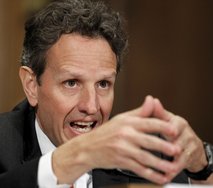 |
| AP |
Tom Raum
WASHINGTON – The United States just passed a dubious milestone: Government debt surged to an all-time high, more than $14 trillion.
That means Congress soon will have to lift the legal debt limit to give the nearly maxed-out government an even higher credit limit or dramatically cut spending to stay within the current cap. Either way, a fight is ahead on Capitol Hill, inflamed by the passions of tea party activists and deficit hawks.
Today’s debt level represents a $45,300 tab for each and everyone in the country.
Already, both sides are blaming each other for an approaching economic train wreck as Washington wrestles over how to keep the government in business and avoid default on global financial obligations.
Bills increasing the debt limit are among the most unpopular to come before Congress, serving as pawns for decades in high-stakes bargaining games. Every time until now, the ending has been the same: We go to the brink before raising the ceiling.
All bets may be off, however, in this charged political environment, despite some signs the partisan rhetoric is softening after the Arizona shootings.
Treasury Secretary Timothy Geithner says failure to increase borrowing authority would be “a catastrophe,” perhaps rivaling the financial meltdown of 2008-2009.
Congressional Republicans, flexing muscle after November’s victories, say the election results show that people are weary of big government and deficit spending, and that it’s time to draw the line against more borrowing.
Defeating a new debt limit increase has become a priority for the tea party movement and other small-government conservatives.
So far, the new GOP majority has proved accommodating. Republicans are moving to make good on their promise to cut $100 billion from domestic spending this year. They adopted a rules change by House Speaker John Boehner that should make it easier to block a debt-limit increase.
The national debt is the accumulation of years of deficit spending going back to the days of George Washington. The debt usually advances in times of war and retreats in peace.
Remarkably, nearly half of today’s national debt was run up in just the past six years. It soared from $7.6 trillion in January 2005 as President George W. Bush began his second term to $10.6 trillion the day Obama was inaugurated and to $14.02 trillion now. The period has seen two major wars and the deepest economic downturn since the 1930s.


Be the first to comment on "US debt passes $14 trillion, Congress weighs caps"